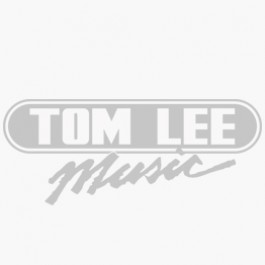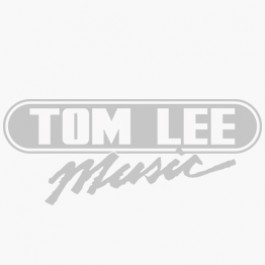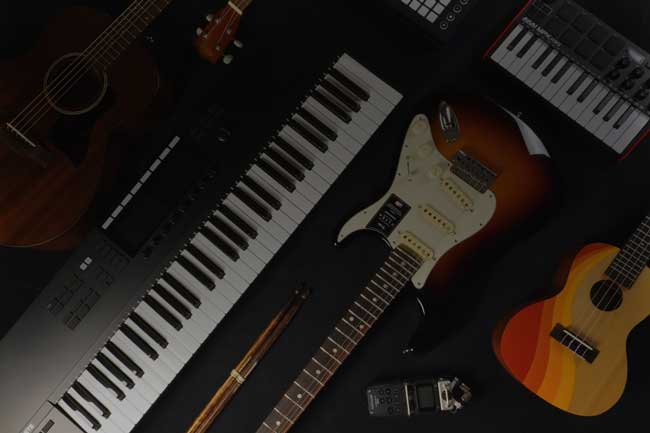- Catalog #: SU-OM-108
What is Omnichord?
Released in 1981, the Omnichord is an electronic musical instrument with an automatic accompaniment function (auto bass/chord) and equipped with a harp sensor. By pressing a chord button and sliding your finger on the harp sensor (strumplate), an arpeggio corresponding to the chord is heard, allowing anyone to easily accompany a song. Omnichord does not require any previous musical experience with an instrument, or even knowledge of staff notation. All that is needed are the chord names required to play a song which is a method commonly known as ‘tab’. Combined with its portability, Omnichord became extremely popular, especially in Europe and America as a new musical instrument that anyone can enjoy anywhere. In addition, due to the unique electronic sounds that are reminiscent of the 80's, and the tactile way musical expressions are achieved, Omnichord has developed cult status around the world. It not only appears in recorded music, but also publicity photos, and has featured in the titles of songs and albums. The Omnichord name was discontinued after the OM-300 (released in 1996), but its popularity as a unique musical instrument has endured the test of time, and now, over 40 years later the Omnichord returns with the OM-108.
You can play accompaniment straight away, even if you have never played a musical instrument before.
Simply press a chord button and slide your finger on the strumplate. In this way, you can play accompaniment to almost any song on the very same day you first try the Omnichord!
The sound of the classic OM-84 is reproduced with analogue circuits.
We put a great deal of effort into the design of the Omnichord so that it accurately reproduces the sound of the OM-84, a model that is hailed as a masterpiece for its tone and versatility. To achieve this in the OM-108, we decided to apply the same method for sound creation as the OM-84, incorporating real analogue circuitry into the new model. In total, the OM-108 is equipped with 10 types of strumplate tones, whilst “omni1” and “omni2” reproduce the classic sound of the OM-84, revived for future generations to enjoy.
Equipped with both retro and new tones.
The OM-108 includes a selection of timeless instrument tones that are both retro and current. The “celeste”, “harp”, and “piano” featured in previous models. The “FM piano” tone is new, this is an electric piano sound that helped define 1980s music. The OM-108 is equipped with “omni1” and “omni2” which use real analog circuitry. Other tones are reproduced using PCM sound generation.
There are 10 tones…omni1/omni2/harp/celeste/A.piano/guitar/FM piano/organ/vibes/banjo(omni1 and omni2 have the same Main Voice but different Sub Voices).
Layer function that creates expression of sound.
The model OM-84 was equipped with two electronic harp tones, allowing the tones to be layered and played. OM-108 reproduces this function. A tone that sounds beautiful when layered with the Main Voice has been assigned as a Sub Voice. To control each layer, simply turn the appropriate Volume knob. This enables real time control changes adding expression to your sound.
Updated rhythm selection with popular drum beats.
Even though many rhythms included in the OM-108 share the same names as previous models, they have been updated to incorporate rhythm patterns that are current. Also, for the first time on Omnichord, a trap beat (Hip Hop) has been included. We have selected “usable” rhythms that will allow you to play a wider variety of songs.
There are 10 kinds of rhythm…rock1/rock2/slow rock/country/swing/disco/hip hop/funk/bossanova/waltz
Adding sus4 and add9 allows OM-108 to play 108 chords
The “sus4”' and “add9” chords, often used in popular music, have been added. It is now possible to play a total of 108 chord types, hence the model number ‘OM-108’. The Omnichord has developed into an instrument that can be played more intuitively without having to substitute other chords.
Sensitive strumplate that fully expresses light touch playing.
Equipped with a wide type strumplate similar to models OM-100 onwards. Every corner of the plate responds sensitively to light touch, so you can concentrate on playing without stress.
Possible to play a melody using the chord buttons.
When you press the "KEYBOARD" button, the chord buttons can be played as a 20-key melody keyboard(octave shift up and down is possible)*, and you can also layer tones.
*When the tone "omin1" is selected, the sound is monophonic, and when other selections are selected, the sound is polyphonic.
Drum pad on both chord buttons and strumplate.
In addition to the melody keyboard, the OM-108 is equipped with drum pad mode for the first time as a function (when the "KEYBOARD" button is pressed). Owners of the OM-108 will be pleased to note the drum pad is assigned not only to the chord button, but also to the strumplate. This allows for the creation of interesting beats using the OM-108 retro drum kits.
Expand sound with MIDI OUT
The OM-108 not only sends chords and strumplate data, but also drum performance information from MIDI OUT. Strumplate information can be sent on two MIDI channels, allowing you to layer tones with external MIDI sound sources, or to layer the OM-108 internal sounds with external sound sources. The OM-108 has evolved into an instrument that invites you to explore more creative sounds using MIDI.
Can be switched to OM-84 drum kit.
The OM-108 includes rhythm voicing from the OM-84, which is extremely popular for its early 1980s retro sound. You can switch the rhythm tones between OM-108 and OM-84 by using a special ‘power-on’ operation.
Play anytime, anywhere.
Although it has a built-in speaker, the Omnichord is small, lightweight, and battery-powered*, making it easy to carry and play. Connect an external amplifier and headphones, and you can perform anywhere, such as in the studio, performing at a live venue, or just playing in your bedroom!
*Powered by 8, AA batteries or dedicated AC adapter (both sold separately).
REAL-TIME CONTROL.
Using “REAL TIME CONTROL”, the OM-108 integrates multiple functions for switching the way chords and rhythms are played. Whether you want to add bass accompaniment or start with a drum prelude, you can easily switch in real time even during a performance.
The built-in speaker can also be used as a monitor.
When connecting to an external speaker etc., you can turn on/off the sound produced by the speaker of the instrument. This is useful when you want to monitor your own sound during live performances. This is a new feature included on the OM-108 in direct response to user’s requests.
Features:
1 KEYBOARD
2 VOICE
Equipped with 10 strumplate tones. In the reproduction, the tones of "omni1" and "omni2" are the same as those found on the OM-84, reproduced using analog circuitry. In addition, it is equipped with the electric piano "FM piano", which was all the rage in the 1980s, while carefully selecting "celeste", "harp", etc. from multiple models from the past. We carefully selected 10 tones which represent popular instruments from the past, and still resonate in today's music scene.<Tone>
omni1/omni2/harp/celeste/A.piano/guitar/FM piano/organ/vibes/banjo
3 RHYTHM
Equipped with a selection of 10 rhythm patterns that correspond to a variety of music styles. For the first time on any Omnichord, the OM-108 features a trap beat (hip hop). In addition, although some rhythms share the same name as the past models, we have updated many, by incorporating a rhythm pattern that is more current.<RHYTHM>
rock1/rock2/slow rock/country/swing/disco/hip hop/funk/bossanova/waltz
4 CHORD
You can play 108 chords just by pressing 1 to 3 chord buttons. “Sus4” and “add9'' chords, which are often used in popular music, have been added to the OM-108.5 Main & Sub Voice Volume
Each of the 10 tones can be layered with a second tone: Main Voice and Sub Voice, and these can be controlled with individual knobs. For example, when "harp" is selected, "harp" is assigned to the Main Voice, and "Synth Strings" is assigned to the Sub Voice. Create your own sound by adjusting each volume control, thus changing the balance between the two voices. Each Main Voice is pre-assigned with a tone as a Sub Voice that will resonate beautifully when layered.6 STRUMPLATE
The strumplate is one of the Omnichord’s major features. If you slide your fingers on the strumplate while holding down a chord button, the chord and corresponding arpeggio will sound, similar to a harp, across four octaves.7 SPEAKER
When connecting to an external speaker etc., you can turn on/off the sound produced by the speaker of the instrument. We listened to the request of Omnichord players who wanted to monitor their own sound during live performances.8 REAL-TIME CONTROL
It integrates multiple functions that allow you to change the way you play chords and rhythms, such as playing at free tempo, adding bass accompaniment, or starting with a drum prelude.9 MIDI OUT
You can send chords, strumplate, and drum performance information via MIDI OUT. Strumplate tones can be sent on two separate MIDI channels, allowing for the layering of tones using external MIDI sound sources.
Specifications:
| Chord buttons | 38 |
| Chords | major, minor, 7th, major7th, minor7th, augmented, diminished, suspended4th, add9th |
| Voices | 10 tones (main, sub tones) / 4 octaves |
| Rhythm Pattern | 10 patterns |
| Control | Master Volume, Chord Volume, Main Voice Volume, Sub Voice Volume, Sustain, Rhythm Volume, Tempo |
| Button Controls | Power, Chord, KEYBOARD ON/OFF, Voice Select, Rhythm Select, Chord-Manual/Auto, Chord Hold, Rhythm-Start / Sync Start |
| Other Functions | Instant OFF, Transpose, Octave Shift, ON/OFF SPEAKER, Master Tuning |
| Speaker | 10cm |
| Amplifier output | 4.3W |
| Jack | DC inlet, LINE OUT (monaural standard), headphone output (Stereo mini), MIDI OUT |
| Power Supply | AC adapter, 8 AA alkaline or Ni-MH batteries (all sold separately) |
| Power consumption |
3.7W |
| Continuous battery operation time | Approximately 8 hours |
| Measurement | W45.7 x D25.0 x H5.18cm(17.99 x 9.84 x 2.04 in.) |
| Weight | 1.2kg(2.65lb) |
| Accessories | Melody keyboard overlayer |





